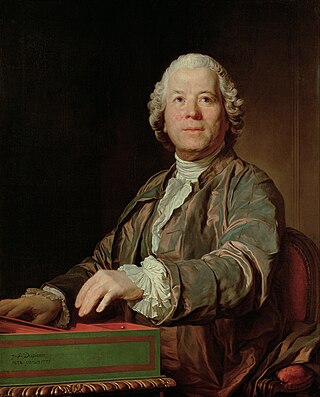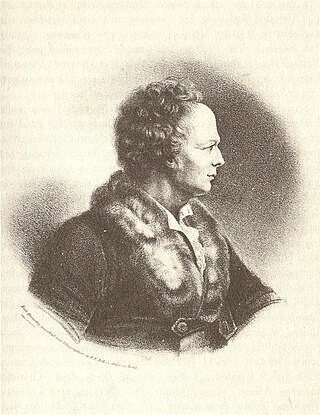
Christoph WillibaldGluck was a composer of Italian and French opera in the early classical period. Born in the Upper Palatinate and raised in Bohemia, both part of the Holy Roman Empire, he gained prominence at the Habsburg court at Vienna. There he brought about the practical reform of opera's dramaturgical practices for which many intellectuals had been campaigning. With a series of radical new works in the 1760s, among them Orfeo ed Euridice and Alceste, he broke the stranglehold that Metastasian opera seria had enjoyed for much of the century. Gluck introduced more drama by using orchestral recitative and cutting the usually long da capo aria. His later operas have half the length of a typical baroque opera. Future composers like Mozart, Schubert, Berlioz and Wagner revered Gluck.

Orfeo ed Euridice is an opera composed by Christoph Willibald Gluck, based on the myth of Orpheus and set to a libretto by Ranieri de' Calzabigi. It belongs to the genre of the azione teatrale, meaning an opera on a mythological subject with choruses and dancing. The piece was first performed at the Burgtheater in Vienna on 5 October 1762, in the presence of Empress Maria Theresa. Orfeo ed Euridice is the first of Gluck's "reform" operas, in which he attempted to replace the abstruse plots and overly complex music of opera seria with a "noble simplicity" in both the music and the drama.

Alceste, Wq. 37, is an opera by Christoph Willibald Gluck from 1767. The libretto was written by Ranieri de' Calzabigi and based on the play Alcestis by Euripides. The premiere took place on 26 December 1767 at the Burgtheater in Vienna.

Opera seria is an Italian musical term which refers to the noble and "serious" style of Italian opera that predominated in Europe from the 1710s to about 1770. The term itself was rarely used at the time and only attained common usage once opera seria was becoming unfashionable and beginning to be viewed as something of a historical genre. The popular rival to opera seria was opera buffa, the 'comic' opera that took its cue from the improvisatory commedia dell'arte.

Atalanta is a pastoral opera in three acts by George Frideric Handel composed in 1736. It is based upon the mythological female athlete, Atalanta, the libretto being derived from the book La Caccia in Etolia by Belisario Valeriani. The identity of the librettist is not known.

Marc Minkowski is a French conductor of classical music, especially known for his interpretations of French Baroque works. Minkowski was musical director of Mozartwoche in Salzburg, Austria, from 2013 to 2017 and is the current general director of Opéra national de Bordeaux. Marc Minkowski is a Chevalier du Mérite.
Paride ed Elena is an opera by Christoph Willibald Gluck. It is the third of Gluck's so-called reform operas for Vienna, following Orfeo ed Euridice and Alceste, and the least often performed of the three. Like its predecessors, the libretto was written by Ranieri de' Calzabigi. The opera tells the story of the events between the Judgment of Paris and the flight of Paris and Helen to Troy. It was premiered at the Burgtheater in Vienna on 3 November 1770.

Le cinesi is an opera in one act, with music composed by Christoph Willibald Gluck. The Italian-language libretto was by Pietro Metastasio, and he described it as a componimento drammatico. This libretto had first been set by Antonio Caldara in 1735. For Gluck's rework, the piece is often considered as an azione teatrale, even though Metastasio and the composer both retained the original designation. The work was first performed for the Austrian royal family at the Schloss Hof on 24 September 1754, on the occasion of the visit of the Empress Maria Theresa to the household of Saxe-Hildburghausen.

Ferdinando Gasparo Bertoni was an Italian composer and organist.
Benjamin Bayl is a Dutch and Australian conductor who works with symphony and chamber orchestras, opera houses and period instrument orchestras in Europe, Asia and Australia.

Bampton Classical Opera is an opera company based in Bampton, Oxfordshire and founded in 1993. It specialises in the production of lesser known opera from the Classical period. Performances are always sung in English. Opera today called the company 'ambitious, innovative and imaginative'.
Donnie Ray Albert is an American operatic baritone who has had an active international career since 1976.

Le feste d'Apollo is an operatic work by Christoph Willibald von Gluck, first performed at the Teatrino della Corte, Parma, Italy, on 24 August 1769 for the wedding celebrations of Ferdinand, Duke of Parma and Archduchess Maria Amalia of Austria.
Ezio is an opera seria from the Early Classical Period in three acts composed by Christoph Willibald Gluck, staged in 1750 and revised in 1763.
Gwawr Edwards is a Welsh concert soprano. Edwards is best known for her television and radio appearances, and has recorded with Bryn Terfel.
La danza is an opera by the composer Christoph Willibald Gluck. The title page describes it as a componimento drammatico pastorale in one act. It was first performed at Laxenburg near Vienna on 5 May 1755.

Il Parnaso confuso is an opera by the composer Christoph Willibald Gluck. It takes the form of an azione teatrale in one act. The Italian-language libretto is by Pietro Metastasio. The opera premiered on 24 January 1765 at Schönbrunn Palace in Vienna. All the members of the cast were archduchesses of the Habsburg family and the work was conducted by the future Emperor Leopold II from the harpsichord.

Schlosstheater Schönbrunn is a stage at Schönbrunn Palace in Vienna which opened in 1747. The Baroque theatre now serves for the training of students of acting and opera of the University of Music and Performing Arts Vienna (MDW), and for performances of the Musik Theater Schönbrunn.












